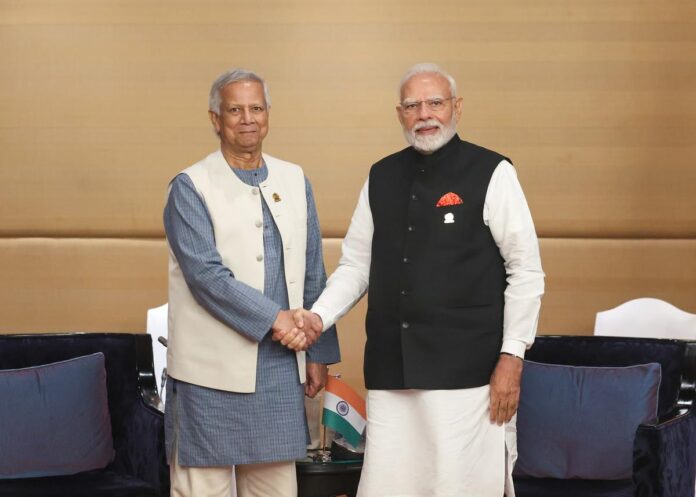By P.K.Balachandran
Colombo, April 4 – Being unsure of American backing after maverick Donald Trump replaced Joe Biden at the White House, India has been taking small steps to mend fences with its estranged neighbors, China and Bangladesh.
But Pakistan will continue to be an exception in the region. India will carry on with its adversarial policy towards Pakistan because that brings a rich haul of votes in domestic elections in politically dominant North India.
Trump’s punishing tariffs announced on Wednesday, have hastened India’s bid to make up with China and Bangladesh. Trump had reserved some of the heaviest tariff blows for what he called “nations that treat us badly” and the list includes India.
Tariff is now 34% on goods from China and 27% on goods from India. Trump did not spare even traditional US allies like the European Union (a 20% hike) and Japan (a 24% hike). All this showed that Trump, driven purely by financial interest, could not be expected to be considerate to even friends and long-time allies.
Making up with China
In a recent interview, Prime Minister Narendra Modi spoke positively about India’s relationship with rival China. He said normalcy had returned to the disputed India-China border and called for stronger ties.
Commenting on this, South Asia expert Michael Kugelman said thse were “striking comments, because tensions have been high since a nasty border clash in the northern Ladakh region in 2020 – the deadliest since a 1962 war.”
China responded positively to Modi’s remarks. Its Foreign Ministry spokeswoman Mao Ning expressed appreciation for Modi’s words and declared that the two countries should be partners that contribute to each other’s success.
In the past year or so, India has realised that Chinese investment would bring critical capital to key Indian industries and help bring down its US$ 85 billion trade deficit with China. From China’s point of view, an increase in such investments would give it greater access to the world’s fastest-growing major economy. Stronger commercial co-operation would also provide incentives to keep broader tensions down, Kugelman observes.
The Indian government’s Chief Economic Advisor V.Anantha Nageswaran had publicly called for Chinese investments to help Indian industries grow. Indian and Chinese armies continue to hold high-level dialogues, which resulted in a deal in October 2024 to resume border patrols. Modi met Chinese President Xi Jinping at a BRICS summit in Russia that month and pledged further co-operation.
In January 2025, the two sides agreed to resume direct flights. Modi and Xi Jinping will have opportunities to meet on the side lines of the BRICS summit in July this year, the G20 in November, and the Shanghai Co-operation Group (SCO) sometime later this year, Kugelman said in his report.
Mending Fences with Bangladesh
India is reaching out to Bangladesh also. Ties with the eastern neighbour had virtually snapped after a mass uprising overthrew the long-time Indian protégé Prime Minister Sheikh Hasina and sent her into exile in India.
The Biden administration in the US had sub-contracted the task of policing South Asia to India and had backed India’s moves and interests in the region in including Bangladesh. But Trump could not be counted upon to follow that policy. He could blow hot and cold.
Cold shouldered by India, the head of the interim Bangladesh government Muhammad Yunus turned to China, met President Xi Jinping and signed nine MoUs. Of special interest to India was the decision to build four speciality hospitals in Kunming for Bangladeshis and building a speciality hospital in Bangladesh itself. There would be an air service between Kunming and Chittagong.
Earlier, Bangladeshis used to go to India for medical treatment. But since India stopped issuing visas for Bangladeshis (peeved at what was done to Sheikh Hasina), people in Bangladesh started looking for alternatives. Yunus looked to China.
Yunus also sought China’s help to develop the Teesta river basin even though India had been objecting to it.
Yunus raised the hackles in New Delhi when he said that Bangladesh is “the only guardian of the Indian Ocean” and that China and the “landlocked” North-Eastern Indian States, Nepal and Bhutan could use Bangladesh to reach the sea. This was interpreted in New Delhi as a plot for the separation of the North Eastern States from India and as a ploy to get Nepal and Bhutan to bypass India and deal directly with Bangladesh to get access to the Bay of Bengal.
India felt that Yunus was catering to the needs of China which has been eyeing parts of India’s North East for long.
Some politicians of Assam went overboard and called for an invasion of Bangladesh to create an area in North Bangladesh where the persecuted Hindus of Bangladesh could be settled.
With the situation getting out of control, and with Trump not of much help, New Delhi seized Bangladesh leader Muhammad Yunus’ request for a summit with Prime Minister Modi on the side lines of the BIMSTEC summit in Bangkok. The two leaders met on Friday.
“I would say the meeting was very constructive, productive and fruitful,” said Yunus’ Press Secretary Shafiqul Alam. “The Chief Adviser discussed all issues of our mutual interest. For example, renewal of the Ganges water treaty, Teesta water sharing, border killings, were discussed,” Alam added.
“We want to have a good relationship with India, a good working relationship,” Foreign Affairs Adviser Touhid Hossain said.
The Yunus-Modi meeting could serve as a confidence-building measure, even amid lingering concerns between the two nations on various issues.
END



 Logging you in...
Logging you in... Loading IntenseDebate Comments...
Loading IntenseDebate Comments...

